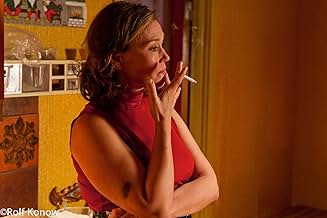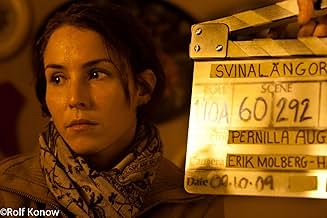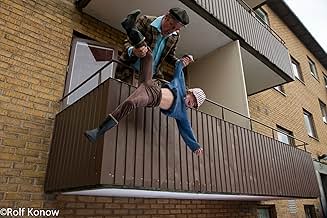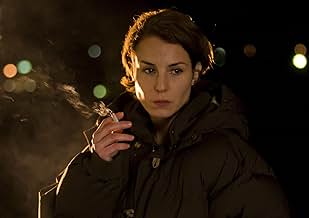IMDb-BEWERTUNG
7,0/10
4491
IHRE BEWERTUNG
Ein Drama, das im Schweden der 1970er Jahre spielt und sich um die Erfahrungen einer jungen Frau dreht, die in einem von Missbrauch und Alkoholismus geprägten Elternhaus aufwächst.Ein Drama, das im Schweden der 1970er Jahre spielt und sich um die Erfahrungen einer jungen Frau dreht, die in einem von Missbrauch und Alkoholismus geprägten Elternhaus aufwächst.Ein Drama, das im Schweden der 1970er Jahre spielt und sich um die Erfahrungen einer jungen Frau dreht, die in einem von Missbrauch und Alkoholismus geprägten Elternhaus aufwächst.
- Auszeichnungen
- 11 Gewinne & 11 Nominierungen insgesamt
Handlung
WUSSTEST DU SCHON:
- WissenswertesOuti Mäenpää originally had no intention to actually take part in filming and attended the casting session just to meet Pernilla August in person. Mäenpää did not want to participate since she was going to get married around the time when the filming was supposed to begin. Eventually her wedding date was not changed, but the filming started a bit later.
Ausgewählte Rezension
I saw this film at Noordelijk Filmfestival 2011 (in Leeuwarden, province of Friesland NL). It stood out between the rest as it gave the audience a topic of discussion afterwards. Living proof could be heard around while leaving the theater, where dialogs exceeded the usual "What did you think? Good, and you?" platitudes with other films. Apparently, it brings about memories, or at least something close nearby. Clearly not an abstract issue from a different part of the world, or what only happens to "not our kind of people". Apart from the relevance of the issues involved, it was also presented in a believable way and with real world characters. Not all of them were coping very well with the problems at hand, but that is part of all real life issues. I had every reason to score 5 (out of 5) stars for the audience award competition.
The story starts with a sudden phone call that Leena's dying mother asked for her. In spite of having lost all contact many years ago, their subsequent journey forces Leena to relive memories from her youth. Alcohol and related domestic violence had a severe impact on her life. She never has understood how her mother could get on with it, and accepted repeated promises from her husband that he would improve. Her mother also failed to take proper care for Leena's brother, mentally handicapped due to an "accident" caused by her father. We witness a lot of that misery via flash backs, showing the gory details, and partly explaining her current behavior. Eventually, the family was split up due to an intervention from social workers aided by the police. It rescued Leena from the immediate problems at that time, but obviously not from the severe impact it had on her life.
Towards her mother she is very defensive and unwilling to forgive anything that happened and spoiled her youth. When the mother asks to locate her husband, Leena brings an urn. Apparently he died without the mother knowing. Nevertheless, the mother lets Leena promise to arrange that they can "rest together", proving a tight relationship between the couple, in spite of everything. It defies our logic and Leena's, to say the least, but from newspaper articles we learn this to be not unusual.
The above is told in well dosed flash backs that interleave with what follows after the phone call that Leena got about her mother in hospital. It all starts with a 600 km journey, together with her husband and two children, to see her mother. Leena is very reluctant to take part in this trip, but her husband insists that it is only human to follow up on that call. After the four briefly speak with the mother in hospital, they decide to move into the mother's house for the time being. Of course, the objects in this house trigger many memories, and Leena does not cope very well in explaining her behavior to her husband and children. Rather than confiding her direct family in what happened during her childhood, she withdraws. This does not improve after some heavy meetings with her mother. Sudden outbursts are the result, mostly triggered by seemingly trivial things, like cloths discovered by her children in some wardrobe.
The script arranges above ingredients ingeniously, presenting it all in a logical order. It not only tells us step by step what we need to know about Leena's childhood, but also shows that Leena rather had let bygones be bygones. Explaining to her husband and children what happened in her childhood, is not something that comes easily. While being logical in our view to share your problems with people you trust most, it costs her too much pain to even consider bringing it in the open. Her withdrawn behavior combined with several unexplainable outbursts seem to stretch family relations beyond their limits (hence the title of this film??). I cannot tell you that all is well that ends well (to prevent spoilers).
All in all, I cannot think of any negative comments about this film. All actors, including the children, act believably and succeed in getting us involved in the characters, even in the "bad" ones (mind the quotes). The structure of the story is next to perfect. Finally, as said before, the amount of discussion it triggered among the audience, is an extra aspect for giving high praises to this film. You should add it to your "must see" list.
The story starts with a sudden phone call that Leena's dying mother asked for her. In spite of having lost all contact many years ago, their subsequent journey forces Leena to relive memories from her youth. Alcohol and related domestic violence had a severe impact on her life. She never has understood how her mother could get on with it, and accepted repeated promises from her husband that he would improve. Her mother also failed to take proper care for Leena's brother, mentally handicapped due to an "accident" caused by her father. We witness a lot of that misery via flash backs, showing the gory details, and partly explaining her current behavior. Eventually, the family was split up due to an intervention from social workers aided by the police. It rescued Leena from the immediate problems at that time, but obviously not from the severe impact it had on her life.
Towards her mother she is very defensive and unwilling to forgive anything that happened and spoiled her youth. When the mother asks to locate her husband, Leena brings an urn. Apparently he died without the mother knowing. Nevertheless, the mother lets Leena promise to arrange that they can "rest together", proving a tight relationship between the couple, in spite of everything. It defies our logic and Leena's, to say the least, but from newspaper articles we learn this to be not unusual.
The above is told in well dosed flash backs that interleave with what follows after the phone call that Leena got about her mother in hospital. It all starts with a 600 km journey, together with her husband and two children, to see her mother. Leena is very reluctant to take part in this trip, but her husband insists that it is only human to follow up on that call. After the four briefly speak with the mother in hospital, they decide to move into the mother's house for the time being. Of course, the objects in this house trigger many memories, and Leena does not cope very well in explaining her behavior to her husband and children. Rather than confiding her direct family in what happened during her childhood, she withdraws. This does not improve after some heavy meetings with her mother. Sudden outbursts are the result, mostly triggered by seemingly trivial things, like cloths discovered by her children in some wardrobe.
The script arranges above ingredients ingeniously, presenting it all in a logical order. It not only tells us step by step what we need to know about Leena's childhood, but also shows that Leena rather had let bygones be bygones. Explaining to her husband and children what happened in her childhood, is not something that comes easily. While being logical in our view to share your problems with people you trust most, it costs her too much pain to even consider bringing it in the open. Her withdrawn behavior combined with several unexplainable outbursts seem to stretch family relations beyond their limits (hence the title of this film??). I cannot tell you that all is well that ends well (to prevent spoilers).
All in all, I cannot think of any negative comments about this film. All actors, including the children, act believably and succeed in getting us involved in the characters, even in the "bad" ones (mind the quotes). The structure of the story is next to perfect. Finally, as said before, the amount of discussion it triggered among the audience, is an extra aspect for giving high praises to this film. You should add it to your "must see" list.
Top-Auswahl
Melde dich zum Bewerten an und greife auf die Watchlist für personalisierte Empfehlungen zu.
- How long is Beyond?Powered by Alexa
Details
- Erscheinungsdatum
- Herkunftsländer
- Offizieller Standort
- Sprachen
- Auch bekannt als
- Beyond
- Drehorte
- Produktionsfirmen
- Weitere beteiligte Unternehmen bei IMDbPro anzeigen
Box Office
- Budget
- 3.000.000 $ (geschätzt)
- Weltweiter Bruttoertrag
- 5.796.679 $
- Laufzeit1 Stunde 39 Minuten
- Farbe
- Sound-Mix
- Seitenverhältnis
- 1.85 : 1
Zu dieser Seite beitragen
Bearbeitung vorschlagen oder fehlenden Inhalt hinzufügen

Oberste Lücke
By what name was Bessere Zeiten (2010) officially released in Canada in English?
Antwort


























